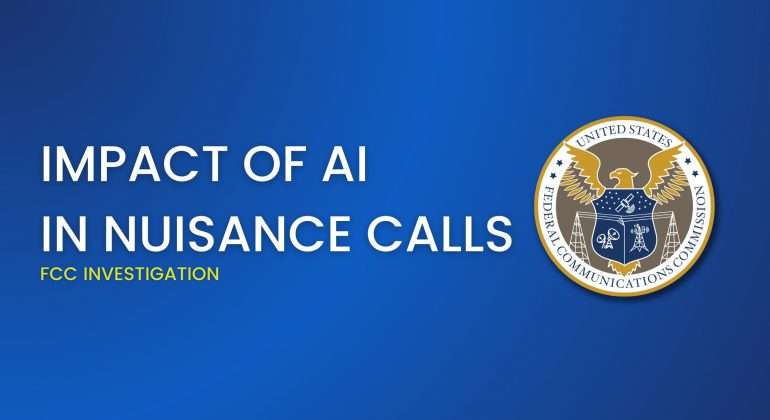The Federal Communications Commission of United States is all set to investigate the impact of AI on the rapid increase in the incidence of nuisance calls and texts through a comprehensive inquiry. Speaking about the same at a conference, FCC Chairwoman Jessica Rosenworcel announced that they are planning to launch an extensive inquiry to study the impact of the proliferation of AI in terms of nuisance calls and understand how AI technologies can be used for consumer safety under the Telephone Consumer Protection Act (TCPA).
While she embraced the potential of AI and its significance in promoting communication and improving efficiency, impact, and resilience, she insisted that there are a lot of challenges associated with this move. Ms. Rosenworcel said, “It will be a mistake if we only focus on the laidback. The organization must focus on artificial intelligence and improve the technology to analyze robocalls and messages”.
As voice cloning scams are on the rise, the importance of screening robocalls was reiterated during the discussion. According to Democratic Commissioner Geoffrey Starks, “It is great to see the AI applications in sectors like healthcare and home security; however, it is critical to address the malicious use of AI and explore intersectionality.”
Unknown calls and nuisance calls are not only a waste of your time and energy but can also be a threat to your privacy. However, it is important to understand what these calls are and how to demarcate between the two.
FCC Ramps Up AI Efforts to Combat Surge in Nuisance Robocalls and Sales Pitches
Recently, there has been a sudden increase in the incidence of robocalls and sales calls from telemarketers. These calls are not only annoying but are uncalled for.
These are considered nuisance calls as they are from companies that are trying to pitch their products to people who have not shown much interest. These calls can be system automated or by telemarketers who would randomly call you and disturb you at any hour.
These calls can be really frustrating and can cause a threat to your privacy. The rising incidence of nuisance calls and robocalls posed a big question regarding the security of the users. To intervene and control this issue, the FCC took a call and is working towards focusing on artificial intelligence to use it efficiently to control robocalls and spam calls.
The Notice of Inquiry
After a 5-0 voting process, the FCC came up with a notice of inquiry that included a thorough investigation of robocalls & robotexts and the prevalence of illegal calls and messages and the actions and guidelines under TCPA.
The comprehensive inquiry plan has many objectives, like
- Integrating AI technologies to make the best use of their potential and see how they work in alignment with FCC’s goals and TCPA.
- To find the scope of AI technologies that fall under the TCPA guidelines so that they can be used in the best possible manner.
- To assess the impact of AI on the current regulatory framework and analyze what adjustments need to be made.
- Authentication of AI-generated content so that there are no incidents of fraud. This could be done by supporting tools to verify AI-generated audio and texts from reliable sources.
- Explore all the possibilities and further action related to AI-generated technologies.
Further Action
AI technologies have immense potential to perform conventional tasks with precision and clarity, these include interpersonal communication, such as voice calls and texts, etc. AI tools are a great way to take all the tools that can filter and block unwanted calls or nuisance calls at bay.
Apart from the unmatched benefits of AI, there are risks of safety concerns and privacy.
The FCC’s plan encompasses understanding the scope, strengths, and benefits of AI. By thoroughly analyzing every aspect of AI including strategies, potential harm, and advantages, suitable strategies can be drafted to make the best use of AI technologies.

